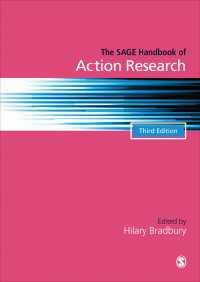Full Description
This volume offers a comprehensive overview of the most pressing issues and developments in the field of ethnomethodology, including ethnomethodological conversation analysis, and highlights new and emerging areas for research. With truly authoritative coverage of the state of the art, including current debates, methodological issues, emerging topics for inquiry, new perspectives on established topics, empirical studies, and resources for study, The Routledge International Handbook of Ethnomethodology features lively, challenging discussions by a diverse range of international practitioners that will provide readers with unrivalled scholarship on ethnomethodology and conversation analysis for years to come. Sections include "Contexts and New Resources", "Theoretical Orientations", "Study Approaches", "Lay and Professional Analysis" and "Areas of Application". Moving past the focus on Garfinkel's "discovery" of the field as a domain of study in the 1950s, and acknowledging how ethnomethodology has changed since then by accounting for both the phenomenologically informed and Wittgensteinian emphases in ethnomethodology, this Handbook constitutes an important update on the study and complexity of the topic. As such, The Routledge International Handbook of Ethnomethodology will be a valuable point of reference for students and scholars across the fields of sociology, communication and science studies, interaction studies, language and linguistics, among others.
Contents
Notes on Contributors
List of Figures
Preface: On the Pedagogy of Ethnomethodology
Acknowledgements
1. Ethnomethodology and Ethnomethodological Conversation Analysis: An Orientation to Studies
K. Neil Jenkings, Oskar Lindwall, Andrew P. Carlin, Michael Mair, Alex Dennis
Section I
Contexts and New Resources for Ethnomethodology
Editorial Section One: Contexts and New Resources for Ethnomethodology
Andrew P. Carlin
2. Ethnomethodology
Michael Lynch
3. Conversation Analysis
Kang Kwong Luke
4. Ways of Working in the Harold Garfinkel Archive
Anne W. Rawls and Jason Turowetz
5. Sacks and Garfinkel: On Ethnomethodological and Sociological Inquiry
Richard Fitzgerald
6. Egon Bittner's Place in Ethnomethodology
Albert J. Meehan
7. The Emergence of Ethnomethodology as a Collaborative Accomplishment
Andrew P. Carlin, Rod Watson and Sheena Murdoch
Section II
Theoretical Orientations
Editorial Section II: Ethnomethodological Readings of Philosophy, Social Theory and the Social Sciences
Michael Mair
8. Alfred Schütz, Aron Gurwitsch, and Harold Garfinkel. The Phenomenological Origins of Ethnomethodology
Christian Meyer
9. Husserl, Heidegger, and Merleau-Ponty
Kenneth Liberman
10. The Documentary Method of Interpretation, Reflexivity, and Indexicality
Alex Dennis
11. Accounts
Lena Jayyusi
12. Respecification: Of Epistopics, Epistemics, the Particle "Oh," and/or Other Puzzles
Philippe Sormani
13. Instructed Action as Non-Foundationalist Foundations
Dušan Bjelić
14. Wittgenstein and Winch
Phil Hutchinson and Wes Sharrock
Section III
Study Approaches
Editorial Section III: Study Approaches
Oskar Lindwall
15. EMCA's Phenomena of Study: A Brief Lexicon
Douglas Macbeth
16. Ethnomethodological Ethnography
Yaël Kreplak and Julia Velkovska
17. The Unique Adequacy Requirement of Methods
Phillip Brooker
18. Membership Categorisation Analysis
Robin James Smith
19. Sequential Analysis
Aug Nishizaka and Kaoru Hayano
20. The Development of Video Analysis: The Work of Charles Goodwin, Marjorie Harness Goodwin, and Christian Heath
Marjorie Harness Goodwin and Asta Cekaite
21. Transcription
Lorenza Mondada
Section IV
Lay and Professional Analysis
Editorial Section IV: Lay and Professional Analysis
Alex Dennis
22. Instructed Action and the Thorny Problems of Actor Knowledge
Timothy Koschmann
23. Instructed Action, in and as Ethnomethodology
Wendy Sherman Heckler
24. Lay and Professional Inquiry: Multimodal Analysis
Andrew P. Carlin, Roger S. Slack, Ricardo Moutinho
25. The Temporality of Social Phenomena
Richard H. R. Harper
26. Ordinary Activities
Peter Tolmie and Mark Rouncefield
27. Hybrid Studies
Nozomi Ikeya
Section V
Areas of Application
Editorial Section V: On the Editorial Practices of (Re-)Presenting and Curating Ethnomethodological Studies
K. Neil Jenkings
28. Family
Sara Keel
29. Education
Hansun Zhang Waring
30. Doing Ethnomethodology and Sport
John Hockey
31. Medicine and Healthcare
Alison Pilnick
32. Science
Janet Vertesi
33. Ethnomethodology and Organisation Studies
Jon Hindmarsh and Nick Llewellyn
34. The Ethnomethods of Law and Order: Studying Cops and Courts
Patrick G. Watson
Index
-

- 洋書電子書籍
- アクション・リサーチ・ハンドブック(第…






